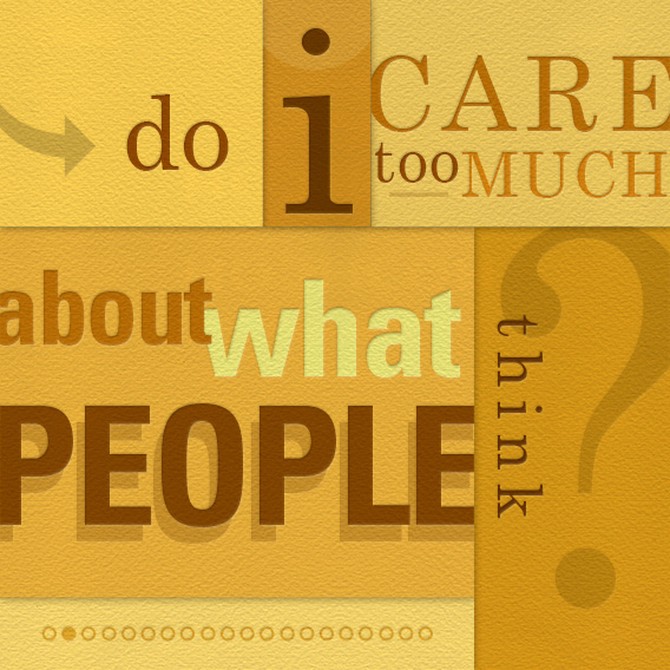20 Questions Every Woman Should Ask Herself
Some are big, some are small. Some are hard to consider, others easy. Some we all must answer, and one has no answer. But asking them changes everything.
Well, what's too much? Here's why I hesitate. If I answer, "No, I don't care what people think," I risk seeming arrogant. But if I answer, "Yes, I care too much about what people think," I risk seeming spineless. Such a statement suggests that I've given away my power without even bruising my knuckles.
Never mind that we all, to some degree, worry about what people think, because we're, you know, human. I don't care whether you're a shock jock or the president of the tacky Christmas sweater club: There's always going to be someone whose love, attention and respect you're courting.
So I'll just give you the honest answer: Yes, I have often cared too much.
I grew up in a preppy enclave of Delaware, where I was the short, wisecracking girl who was neither popular nor unpopular; who pretended to be dumber and richer than she was; who did not speak up when her friends made racist and sexist jokes; who believed that one day, if she kept adopting the customs and attire of the lock-jawed tribe she lived among, she would be seen as normal and everyone would like her. (And then she'd marry David Bowie and ride unicorns bareback in a cloud palace.)
I wish I could say that caring too much about others' opinions vanished as soon as I grew up, but long after I'd left the deb balls and lacrosse fields of my youth, those anxieties still gnawed at me. Instead of writing about what I knew, I spent my 20s imitating others (drunks, junkies, French philosophers) and shying away from what obsessed me, which was the inner lives of women. I thought writing about those things would brand me as either a frivolous lightweight or one more hysterical female.
Then I turned 30. I had a baby girl, and my father, after a 16-year battle with cancer, died at 56. He was someone who lived big, and the last time I saw him, when I told him that I was anxious about this motherhood business, anxious that no one would ever want to publish my work, he replied, "You just have to get out of your own way." I had to write what I had to write. I had to stop worrying about what kind of mother I would be. I had to stop wasting time. Life is brief, but if you're brave, it's deep. That mask I'd been wearing—I had to take it off. I didn't want my daughter to see it in my closet and think it was a part of every woman's wardrobe.
By investing others with the power to dictate who you are, you rob yourself of an opportunity to truly grow. You shortchange yourself by devaluing the experiences and knowledge you've banked, all those things that have been making you, you. And in the end, who cares about being anything else?
—Elissa Schappell, the author of the story collection Blueprints for Building Better Girls (Simon & Schuster).
Never mind that we all, to some degree, worry about what people think, because we're, you know, human. I don't care whether you're a shock jock or the president of the tacky Christmas sweater club: There's always going to be someone whose love, attention and respect you're courting.
So I'll just give you the honest answer: Yes, I have often cared too much.
I grew up in a preppy enclave of Delaware, where I was the short, wisecracking girl who was neither popular nor unpopular; who pretended to be dumber and richer than she was; who did not speak up when her friends made racist and sexist jokes; who believed that one day, if she kept adopting the customs and attire of the lock-jawed tribe she lived among, she would be seen as normal and everyone would like her. (And then she'd marry David Bowie and ride unicorns bareback in a cloud palace.)
I wish I could say that caring too much about others' opinions vanished as soon as I grew up, but long after I'd left the deb balls and lacrosse fields of my youth, those anxieties still gnawed at me. Instead of writing about what I knew, I spent my 20s imitating others (drunks, junkies, French philosophers) and shying away from what obsessed me, which was the inner lives of women. I thought writing about those things would brand me as either a frivolous lightweight or one more hysterical female.
Then I turned 30. I had a baby girl, and my father, after a 16-year battle with cancer, died at 56. He was someone who lived big, and the last time I saw him, when I told him that I was anxious about this motherhood business, anxious that no one would ever want to publish my work, he replied, "You just have to get out of your own way." I had to write what I had to write. I had to stop worrying about what kind of mother I would be. I had to stop wasting time. Life is brief, but if you're brave, it's deep. That mask I'd been wearing—I had to take it off. I didn't want my daughter to see it in my closet and think it was a part of every woman's wardrobe.
By investing others with the power to dictate who you are, you rob yourself of an opportunity to truly grow. You shortchange yourself by devaluing the experiences and knowledge you've banked, all those things that have been making you, you. And in the end, who cares about being anything else?
—Elissa Schappell, the author of the story collection Blueprints for Building Better Girls (Simon & Schuster).
From the April 2014 issue of O, The Oprah Magazine


